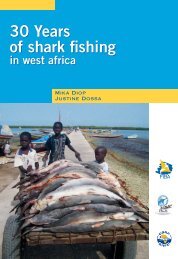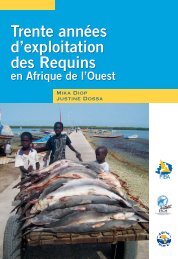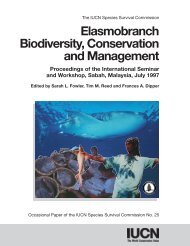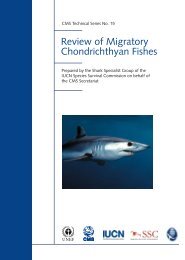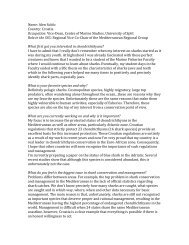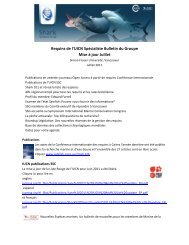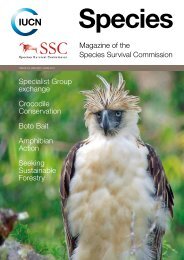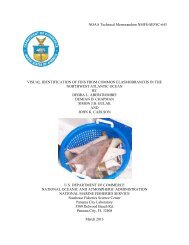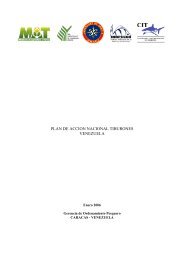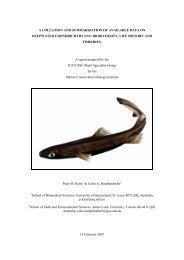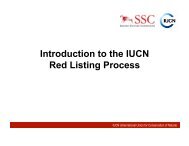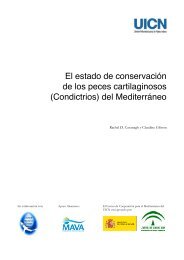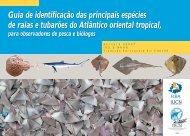Magazine of the species survival Commission specialist Group - IUCN
Magazine of the species survival Commission specialist Group - IUCN
Magazine of the species survival Commission specialist Group - IUCN
You also want an ePaper? Increase the reach of your titles
YUMPU automatically turns print PDFs into web optimized ePapers that Google loves.
sos – save our <strong>species</strong><br />
New Harlequin <strong>species</strong> (Atelopus) discovered. © Robin Moore<br />
approach is applied by many people around <strong>the</strong> world for <strong>the</strong><br />
simple reason that it is successful and mobilizes people’s<br />
passion. Wild <strong>species</strong> are <strong>the</strong> building blocks <strong>of</strong> nature; <strong>the</strong>y<br />
provide one <strong>of</strong> <strong>the</strong> best indicators <strong>of</strong> biodiversity status, are<br />
covered by legislation and conventions, and, above all, <strong>the</strong><br />
general public understands what a <strong>species</strong> is and what<br />
<strong>species</strong> conservation means. This targeted approach allows<br />
more complex issues to be tackled, both at ecosystem and<br />
landscape levels, and with both governments and<br />
communities.<br />
Biodiversity conservation will benefit from <strong>the</strong> financial<br />
resources and creativity <strong>of</strong> businesses and corporations. In<br />
return, SOS will help <strong>the</strong> private sector meet <strong>the</strong>ir goals on<br />
sustainable development, satisfying <strong>the</strong> ever-increasing green<br />
needs <strong>of</strong> shareholders, customers and employees alike.<br />
Given <strong>the</strong> sheer number <strong>of</strong> threatened <strong>species</strong>, it will be<br />
impossible to fund conservation efforts for each and every<br />
one. As such, SOS will set priorities for funding. It will<br />
combine <strong>the</strong> collective knowledge and expertise <strong>of</strong> <strong>the</strong><br />
Species Survival <strong>Commission</strong> (SSC) with <strong>the</strong> ingenuity <strong>of</strong> <strong>the</strong><br />
private sector, to create a mechanism that ensures that<br />
sufficient funding is allocated to those projects most in need,<br />
thus maximizing its impact.<br />
A small number <strong>of</strong> priorities will be identified, with new<br />
ones being added every year. The identification <strong>of</strong> priorities<br />
will be coordinated by <strong>the</strong> SOS Working <strong>Group</strong>, chaired by<br />
Luigi Boitani, which will work closely with <strong>the</strong> SOS Secretariat<br />
based at <strong>IUCN</strong> Headquarters in Gland, led by Jean-<br />
Christophe Vié.<br />
During <strong>the</strong> project preparation phase, a number <strong>of</strong> pilot<br />
projects were identified. SOS is currently supporting five<br />
projects, all approved by <strong>the</strong> SOS Donor Council, <strong>the</strong><br />
governing body composed <strong>of</strong> representatives <strong>of</strong> <strong>the</strong> main<br />
donors. Four <strong>of</strong> <strong>the</strong>se projects are existing grant-making<br />
mechanisms: BirdLife International’s Preventing Extinctions<br />
Programme; <strong>the</strong> Conservation Leadership Programme;<br />
EDGE (Evolutionarily Distinct and Globally Endangered)<br />
Species Programme <strong>of</strong> <strong>the</strong> Zoological Society <strong>of</strong> London;<br />
and <strong>the</strong> Amphibian Conservation Programme <strong>of</strong><br />
Conservation International. The fifth project is an emergency<br />
response directed towards <strong>the</strong> Critically Endangered Saiga<br />
Antelope (Saiga tatarica), following <strong>the</strong> death <strong>of</strong> nearly 12,000<br />
individuals <strong>of</strong> this <strong>species</strong> in western Kazakhstan last May.<br />
A call for proposals will be announced at <strong>the</strong> beginning <strong>of</strong><br />
2011, and <strong>the</strong> active search for additional funding will<br />
continue. Nokia, <strong>the</strong> world’s leading telecommunications<br />
company and one which has a long track record <strong>of</strong> taking<br />
sustainability into account in all business operations, is <strong>the</strong><br />
first company to announce its partnership with SOS. Nokia,<br />
through its 1.3 billion users <strong>of</strong> mobile phones, will help raise<br />
awareness <strong>of</strong> <strong>the</strong> need for biodiversity conservation.<br />
SOS is aiming to achieve a significant increase above<br />
existing investments in <strong>species</strong> conservation over <strong>the</strong> next<br />
five years. The initial target is USD 20 million. Thanks to<br />
generous pledges from <strong>the</strong> SOS founding partners and<br />
o<strong>the</strong>rs, we are already more than 50% <strong>of</strong> <strong>the</strong> way to<br />
achieving this goal, and intend to match this amount with<br />
private sector contributions. These first steps will enable SOS<br />
to move forward and demonstrate that <strong>species</strong> conservation<br />
can, and does, work.<br />
For more information, and to watch our launch video,<br />
please visit <strong>the</strong> SOS website: www.SOSpecies.org<br />
If you have any questions, please contact:<br />
Elke Blodau<br />
Marketing and Communications Officer<br />
Save Our Species Programme<br />
elke.blodau@iucn.org<br />
12 • <strong>species</strong> 52




